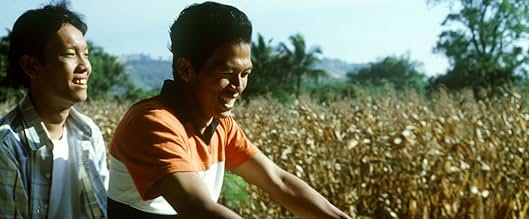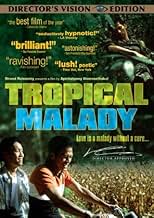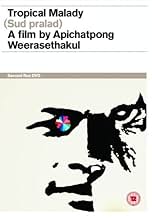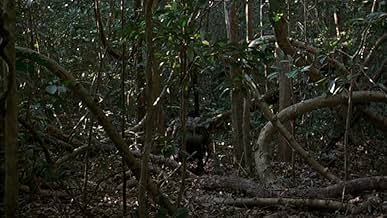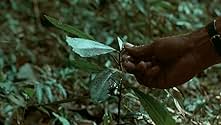IMDb RATING
7.1/10
6.7K
YOUR RATING
A romance between a soldier and a country boy, wrapped around a Thai folk-tale involving a shaman with shape-shifting abilities.A romance between a soldier and a country boy, wrapped around a Thai folk-tale involving a shaman with shape-shifting abilities.A romance between a soldier and a country boy, wrapped around a Thai folk-tale involving a shaman with shape-shifting abilities.
- Director
- Writer
- Stars
- Awards
- 7 wins & 8 nominations total
- Director
- Writer
- All cast & crew
- Production, box office & more at IMDbPro
Featured reviews
Having had a good think about the film after seeing it this afternoon, I still can't escape the feeling that there was a really excellent film in the subject matter and narrative elements, but that the director just hadn't quite found a way to get that film to the screen. Instead, he found a film that ultimately taxes most viewer's patience. There were some really lovely elements, I agree, but there is something about the editing that was just this side of over indulgent (and I happen to generally like long, loving, camera shots that are meditative!). The jungle portion of the film, IMHO, suffered from a lack of visual information in most instances (and yet this is one of the strengths of some the individual jungle scenes, like those of the tree, the tiger and ghost ox, where, just because of this unrelenting sameness, stand out marvelously). It could have been half the length and by virtue of that, twice as effective. Having said as much, I look forward to seeing more by this director, he clearly has a head on his shoulders and the courage to tackle difficult (yet rewarding) ideas.
Even if the first part is pretty "straight" forward the second part left me baffled - maybe that was the point?... I am almost certain that I can interpret it somehow but anything I would say might and can be wrong, that's because I am somewhat convinced it's a very Thailand "kind of thing", it being a folk story. I think it has something to do with greed, because of the little story in the first part with the two farmers and the little monk.
I am still mesmerized by Apichatpong Weerasethakul's approach to framing and camera work. I find it fascinating and boring but in a good way. It's like therapy, it's like really absorbing the nature or the setting. It's like an optical illusion sometimes, the longer you stare at a frame, the deeper you go, it's hypnotizing.
Of to the next Weerasethakul - but not right away. I will let this one settle in first.
I am still mesmerized by Apichatpong Weerasethakul's approach to framing and camera work. I find it fascinating and boring but in a good way. It's like therapy, it's like really absorbing the nature or the setting. It's like an optical illusion sometimes, the longer you stare at a frame, the deeper you go, it's hypnotizing.
Of to the next Weerasethakul - but not right away. I will let this one settle in first.
"Greed is our downfall. I was watching Who Wants to be a Millionaire. The woman won a lot of money but wouldn't stop playing. She lost and only got 30.000 Baht."
"The tiger trails you like a shadow. His spirit is starving and lonesome. I see you are his prey and his companion."
The experimental creator of "Mysterious Object at Noon" is back with another abstract gem, "Tropical Malady." This time we have a 2-parter connected by common themes and metaphors, a la Wong Kar Wai's Chungking Express, equally casual but much slowly paced here. The first part of the film is set in everyday world. A gay soldier pursues a young country boy. The boy is most likely not gay, but he returns the attraction most of the time, probably because he is attracted to the soldier on another level (e.g. he is fascinated by the soldier's uniform). One day, while the soldier is flipping through the boy's photo album, suddenly the movie blacks out -- enter part 2, a story inspired by legends that parallels part 1, but from an alternative angle that makes it challenging to detect the patterns. Set in the dark tropical forest, the soldier relentlessly hunts a tiger ghost spirit for love, fear, or both (foreshadowed by a shooting computer game played by the boy who later appears as the tiger spirit). The tiger is fascinated by the soldier's sound device. The soldier is warned that he must either kill the tiger or be devoured by it.
Part 1 and part 2 are both about desire and pursuit, and essentially follow the same path. In both, the soldier makes great effort to pursue his passion, but it leads him nowhere. He is incompatible with the partner of his desire, so it cannot be satisfied in the case of a straight boy or a tiger. The soldier can be classified as greedy, and it will be his downfall. The 'fairytale-esque' romance in part 1 seems almost Utopian, but it's an illusion that cannot be sustained. In the end he will be consumed by his desires.
This is a powerful and challenging film with 2 segments, each providing a distinctive context to view the same patterns. With only 2 or 3 lines of dialogue in the second part of more than 65 minutes, it's a highly sensual and contemplative experience, where every drop of water, wind gently brushing the leaves, and sound of birds singing contributes to your senses. You can literally smell the mud in the fresh rainforest.
The photography is undeniably beautiful. The last shot of the film is sheer poetry that will take your breath away.
"The tiger trails you like a shadow. His spirit is starving and lonesome. I see you are his prey and his companion."
The experimental creator of "Mysterious Object at Noon" is back with another abstract gem, "Tropical Malady." This time we have a 2-parter connected by common themes and metaphors, a la Wong Kar Wai's Chungking Express, equally casual but much slowly paced here. The first part of the film is set in everyday world. A gay soldier pursues a young country boy. The boy is most likely not gay, but he returns the attraction most of the time, probably because he is attracted to the soldier on another level (e.g. he is fascinated by the soldier's uniform). One day, while the soldier is flipping through the boy's photo album, suddenly the movie blacks out -- enter part 2, a story inspired by legends that parallels part 1, but from an alternative angle that makes it challenging to detect the patterns. Set in the dark tropical forest, the soldier relentlessly hunts a tiger ghost spirit for love, fear, or both (foreshadowed by a shooting computer game played by the boy who later appears as the tiger spirit). The tiger is fascinated by the soldier's sound device. The soldier is warned that he must either kill the tiger or be devoured by it.
Part 1 and part 2 are both about desire and pursuit, and essentially follow the same path. In both, the soldier makes great effort to pursue his passion, but it leads him nowhere. He is incompatible with the partner of his desire, so it cannot be satisfied in the case of a straight boy or a tiger. The soldier can be classified as greedy, and it will be his downfall. The 'fairytale-esque' romance in part 1 seems almost Utopian, but it's an illusion that cannot be sustained. In the end he will be consumed by his desires.
This is a powerful and challenging film with 2 segments, each providing a distinctive context to view the same patterns. With only 2 or 3 lines of dialogue in the second part of more than 65 minutes, it's a highly sensual and contemplative experience, where every drop of water, wind gently brushing the leaves, and sound of birds singing contributes to your senses. You can literally smell the mud in the fresh rainforest.
The photography is undeniably beautiful. The last shot of the film is sheer poetry that will take your breath away.
I agree that the film is a little disjointed - things like the very long karaoke scene (what an awful song) I found tedious and unnecessary, but rationalised to myself that the director was trying to create a lighthearted, falling-in-love-and-life-is-so-sweet kind of atmosphere - something I think was done more successfully in the scenes of the couple at the movies, in the forest, etc. This almost lulls you into a false sense of security, though the temple scene foreshadows the dramatic shift in mood that comes with the latter part of the film. The jungle scenes are powerfully spellbinding, both visually and aurally, with their long spells of darkness and almost complete absence of dialogue and they, I believe, make up for any inconsistencies in the earlier part of the film. I saw this in the afternoon, and emerged from the darkness of the cinema and the jungle feeling absolutely intoxicated. I will never forget the tiger's face in the darkness - psychedelic and haunting.
10blindg
"Tropical Malady" from the Thai director Apichatpong Weerasethakul, Jury Prize in the last Cannes Film Festival, is a movie that really consume the inside, like a terminal disease. Every senses of your body will be over-excited, there is a TERRIFIC use of sound effects, that will render the tropical forest a living entity, intelligent, thinking, speaking. The contrast between the horrors and anguishes of modern time and the most charming folk legends , that awaken the most genuine human side from the bottom of our hearts is something quite unique and unforgettable.
It's hard to tell about the story without spoil it. Watch it, no matter what.
It's hard to tell about the story without spoil it. Watch it, no matter what.
Did you know
- TriviaThe same year that this film was chosen to compete at the Cannes, the government sent a delegation of Thai film-makers to the festival. Ironically, when the director asked to be included, officials denied him support, saying that there were no more plane tickets.
- ConnectionsFeatured in The Story of Film: An Odyssey: Cinema Today and the Future (2011)
- How long is Tropical Malady?Powered by Alexa
Details
Box office
- Gross US & Canada
- $46,750
- Opening weekend US & Canada
- $270
- Jun 26, 2005
- Gross worldwide
- $46,750
- Runtime
- 1h 58m(118 min)
- Color
- Sound mix
- Aspect ratio
- 1.85 : 1
Contribute to this page
Suggest an edit or add missing content


